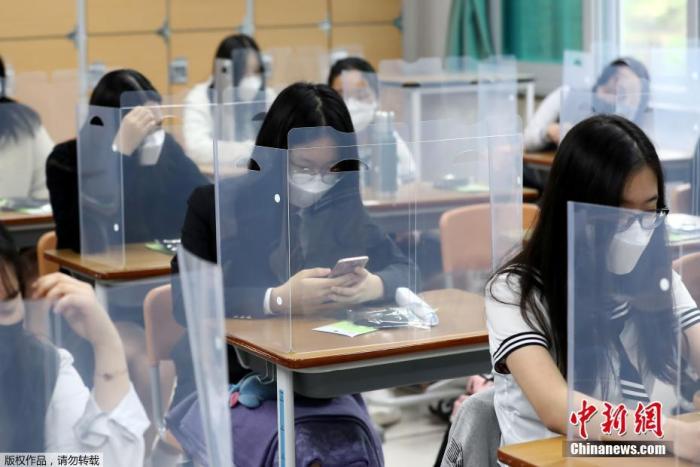Chinanews, August 15th, according to Korean media reports, as of 0:00 on the 15th, South Korea had 166 new confirmed cases of new crown in one day. This is the first time that the country’s single-day new cases have exceeded 100 for two consecutive days since the end of March. example. Due to the recent tightening of the epidemic situation in the South Korean capital, the South Korean Central Disaster Safety Response Headquarters decided on the 15th to upgrade the social distancing measures in Seoul and Gyeonggi Province from the first stage to the second stage for two weeks from the 16th.
Data map: On May 20, local time, Korean high school students resumed classes. Plastic baffles were installed on the desks of a school in Daejeon, South Korea to prevent the spread of the virus.
According to reports, from the 9th to the 15th, the number of new cases of new crowns in the South Korean capital rose from 25 to 139 in a single day, a significant increase. Therefore, the South Korean authorities have decided to expand facilities that are obligated to comply with epidemic prevention regulations, and strongly recommend that the public cancel or avoid unnecessary gatherings and activities.
In view of the imminent opening of schools at all levels, the Korean government also plans to list Internet cafes as high-risk places, requiring strict compliance with relevant epidemic prevention regulations from 6 pm on the 19th. The epidemic prevention department's epidemic prevention requirements for 12 kinds of high-risk facilities, including dance halls, some bars, karaoke rooms, large-scale cram schools for more than 300 people, and cafeterias, are the same as before.
South Korea’s Central Anti-epidemic Countermeasures Headquarters stated that if the epidemic situation does not improve after two weeks, or if it becomes more serious, it will increase the epidemic prevention efforts and extend the implementation of the second phase of measures for two weeks. The government will advise the public to avoid gatherings of more than 50 people indoors and 100 people outdoors. As a result, professional competitions have returned to the "empty field" model, and schools at all levels need to reduce the proportion of offline students.
Kwon Yuk, deputy head of South Korea’s Central Anti-epidemic Countermeasures Headquarters, said that due to the increased risk of the spread of the epidemic in the metropolitan area, the number of new cases in a single day will continue to increase significantly for a period of time. If the public does not comply with anti-epidemic rules such as maintaining social distancing during the holidays, the number of new cases will continue to increase, and the possibility of the spread of the epidemic across the country cannot be ruled out.

